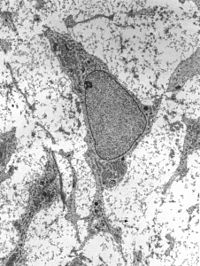
Photo from wikipedia
BACKGROUND Biocompatible hydrogel systems with tunable mechanical properties have been reported to influence the behavior and differentiation of mesenchymal stem cells (MSCs). OBJECTIVE To develop a functionalized hydrogel system with… Click to show full abstract
BACKGROUND Biocompatible hydrogel systems with tunable mechanical properties have been reported to influence the behavior and differentiation of mesenchymal stem cells (MSCs). OBJECTIVE To develop a functionalized hydrogel system with well-defined chemical structures and tunable mechanical property for regulation of stem cell differentiation. METHODS An in situ-forming hydrogel system is developed by crosslinking vinyl sulfone functionalized polyamidoamine (PAMAM) dendrimer and multi-armed thiolated polyethylene glycol (PEG) through a thiol-ene Michael addition in aqueous conditions. The viability and differentiation of MSCs in hydrogels of different stiffness are conducted for 21 days under corresponding induction media. RESULTS MSCs are viable in synthesized hydrogels after 48 hours of culture. By varying the concentrations of PAMAM dendrimer and PEG, hydrogels of different gelation time and stiffness are achieved. The MSC differentiation indicates that more osteogenic differentiation is observed in hard gel (5,663 Pa) and more adipogenic differentiation is observed in soft gel (77 Pa) in addition to the differentiation caused by each individual induction media during the process of culture. CONCLUSIONS A biocompatible in situ-forming hydrogel system is successfully synthesized. This hydrogel system has shown influences on differentiation of MSCs and may potentially be important in developing therapeutic strategies in medical applications.
Journal Title: Bio-medical materials and engineering
Year Published: 2019
Link to full text (if available)
Share on Social Media: Sign Up to like & get
recommendations!